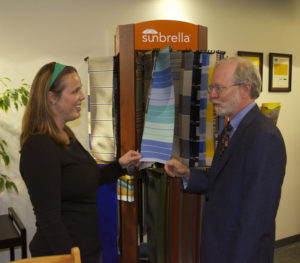
Rainier Industries succeeds with a light footprint and a firm handshake.
For Rainier Industries Ltd., sustain-ability is more than just a buzzword—it’s a way of doing business. Although often associated with high expenses, Rainier president and CEO Scott Campbell considers sustainability an initiative that makes business sense. “It’s actually pretty easy and saves money,” he says, “so the barriers are pretty dang low.”
In 2016, Rainier was honored by King County as one of the Best Workplaces for Waste Prevention and Recycling for the fifth consecutive year, as well as the Re-Innovator of the Year.
Gold Rush roots
Rainier manufactures custom shade, shelter and display products at plants in Tukwila and Statesville, N.C. Founded in 1896, the company originally provided tents and supplies to prospectors in the Alaskan Gold Rush. In 1984, Campbell purchased Rainier, building the operation from 11 to 250 employees. He has since acquired 17 businesses with a range of products including tents, yurts, awning and screen systems, and industrial fabric goods.
Campbell recognized the need to make the company more sustainable, so Rainier developed a sustainability initiative in 2007, which quickly became part of the core mission. In 2009, Rainier received ISO 14001:2004 certification by TÜV Rheinland Group, which specifies requirements for environmental management systems.
Company sustainability efforts range from recycling and repurposing waste products to eliminating harsh chemicals. Rainier recycles more than 70 percent of its waste, redirecting roughly 2,340 tons of waste from landfills. Last year, it added a machine in its packaging department that shreds excess cardboard that can be repurposed as shipping padding.
Many of Rainier’s products are made using sustainable, nontoxic materials, such as wood harvested from sustainable forests and treated with non-solvent preservatives. The use of PVC-based fabrics is minimized, and printers use UV-cured, water-soluble inks.
Building relationships
While some companies favor their customers over their vendors, Campbell takes an atypical path. “We treat all people with respect,” he says. “It has been our experience that building long-term vendor relationships provides better results with less stress.”
Rainier also takes an unconventional approach to dispute resolution. “It’s easier to stay out of trouble than to get out of trouble,” explains Campbell. “Earlier in my career, I eagerly took legal action when I felt it was merited. I soon realized this was a big suck of my time, drained energy and generally benefited few beyond the involved attorneys.”
Also good for business: recruiting individuals with disabilities. As a result of its partnership with Orion Industries, a Washington-based nonprofit organization that provides skills, training, education and mentoring to individuals with disabilities or other barriers to employment, Rainier received the Governor’s Employer Award for Disability Issues and Employment in 2013. Rainier currently employs six Orion graduates.
For companies interested in becoming more environmentally active, Campbell adds, “We’re pretty friendly and happy to help others.” That seems to sum up Rainier’s formula: a kinder, smarter way of doing business.
 TEXTILES.ORG
TEXTILES.ORG


